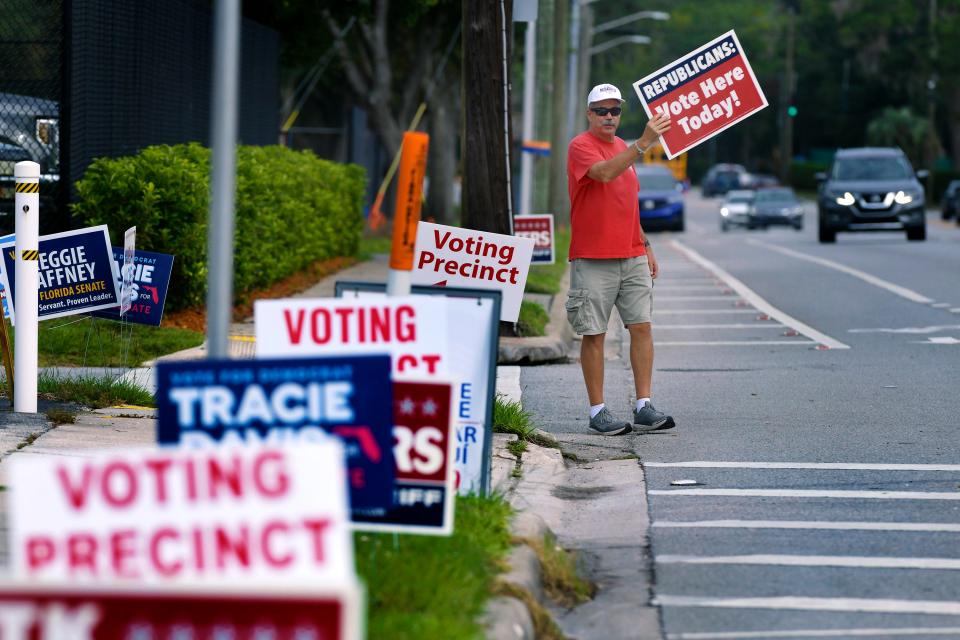Do we live in 2 Americas? Voters reward GOP for economics, but culture wars pull us apart.
Editor's note: This is the fourth in a series of columns exploring the future of the Republican Party and the conservative movement.
Are Americans dividing – not just ideologically but also geographically – over politics? That appears increasingly to be the case.
An Axios poll conducted in late July found that 58% of Republicans and 55% of Democrats have “thought about moving to a state where the government better reflects their political and policy values.” And 69% of Democrats and 65% of Republicans have “considered moving to a state that’s a closer match with their cultural and social values.”
In 2021, a Redfin survey found that about 15% of respondents who had recently moved said they would not live in a place where abortion is fully legal, and that 17% said they prefer not to live in a state where abortion is fully legal. On the other side, 12% of respondents said they would live only in a place where abortion is fully legal; 28% said they would prefer to live in a state without legal restrictions on abortion.
Combined, 72% of people surveyed said they would consider relocating based on a state’s laws regulating abortion. And that was months before the Supreme Court overturned Roe v. Wade this June.

Urban vs. rural split is severe
Voting patterns already reflect this trend. Not a single city in the United States with a population of more than 1 million people is led by a Republican mayor. Long gone are the days when Republicans Rudy Giuliani and Michael Bloomberg served as mayor of New York.
Read the series from USA TODAY:
►Can Republicans move past Trump? For the sake of America, they must.
►Do traditional conservatives still have a home in the Republican Party?
►'We're not going away': Is the rise of conservative media good for democracy?
In America's rural areas, home to a combined 46 million people, it's Democrats who have become an endangered species.
Red states and blue states increasingly are moving in opposite directions on education policy, tax rates and, of course, abortion. The nation's second most populous state, Texas, has now effectively banned abortion. In contrast, the most populated state, California, has become a self-proclaimed sanctuary for women seeking abortions.
Where do our growing divisions, and our growing geographical segregation based on politics, lead us? Are we becoming Red America and Blue America instead of the United States of America?
Opinion alerts: Get columns from your favorite columnists + expert analysis on top issues, delivered straight to your device through the USA TODAY app. Don't have the app? Download it for free from your app store.
Polarization leads to extremism
I'm worried. A psychological phenomenon called group polarization involves “the tendency for groups to show a shift toward the extremes of decision-making when compared to decisions made by individuals.” In other words, when in a like-minded group, individuals tend to become more extreme.
Imagine what this might look like at the state and national levels as we self-segregate based on ideology. Toxic polarization will become even more difficult to defuse once we are surrounded by people who share the same "enemies list" as ours.
Are you a traditional conservative or a Trump Republican? Take our quiz
Yet there's hope – and an opening for Republican leaders – based on economics. The Axios poll found that economic reasons such as cost of living and jobs remain the primary reason people move from one state to another.
And it's red states such as Florida and Texas that tend to have lower taxes, fewer regulations and a much friendlier business environment. It's not by accident that companies such as Caterpillar, Citadel, Hewlett Packard, Oracle and Tesla have left deep blue California and Illinois for better opportunities in the Republican havens of Florida and Texas.

In a 2022 poll conducted by Chief Executive, about 700 CEOs and business owners ranked Texas as the best state for business, a ranking the state has held every year since 2001. Texas has no personal income tax, no corporate income tax, low regulation and a low cost of living. Among those moving to Texas from other states, the top reasons listed are jobs, less expensive land and homes, and lower taxes.
Florida, which also boasts of no state income tax and less regulation, was No. 2 on the Chief Executive list of best states for businesses. California was dead last.
Red and blue America don't trust each other. And that's driving us dangerously apart.
It's not just corporations that are flocking to red states. Millions of Americans are as well. Six of the 10 fastest-growing states in the nation, including Florida and Texas, are dominated by Republicans. And in two other states on that list, Arizona and Nevada, several statewide GOP candidates appear poised to win in November.
Republicans surge in Florida
Even as Florida's population has grown rapidly, it has become more conservative. Only one Democrat, Agriculture Commissioner Nikki Fried, holds statewide office in Florida. Republican voters now outnumber Democratic voters for the first time in Florida's modern history.

Democrats continue to hold out hope of one day returning Texas to its historical position as a blue state. But for now, not a single Democrat holds statewide office in the Lone Star State.
Goodbye, San Francisco. Hello, Nashville: Americans are fleeing dysfunctional cities.
As long as economics remains the dominant reason for state-to-state migration and voter loyalty, Republicans and the conservative movement have a bright future.
But the tendency of some prominent Republican leaders to dwell on hot-button cultural issues could hurt the party's long-term chances. How many business leaders had second thoughts when Florida Gov. Ron DeSantis took on "woke" Disney this year. How many people, especially younger women, grew more hesitant about living in Texas now that it has a near total ban on abortion?
Beyond state level considerations, I fear that a further balkanization of the nation into red America and blue America will make our politics at the federal level even uglier and more dangerous.
If neither side is willing to live with one another, let alone talk to each other, then every election will seem more and more critical and wins and losses harder to accept. Already, we've seen supporters of former President Donald Trump storm the U.S. Capitol because they refused to acknowledge his election loss.
A Republican Party and conservative movement that champion individual liberty, the rule of law and economic growth can compete anywhere and against anyone. But a party and movement that wage culture wars and appeal only to voters who share the same values will pull us further apart.
Americans are free to choose, of course, if they want to move to places that best represent their values. But let’s not forget that we still share a country together.

More from Chris Schlak
Inside CPAC: Lies and conspiracy theories. Is this what conservatism is all about?
Will Gen Z politicians help the country unite? I was disappointed by their answers.
Chris Schlak is an Opinion fellow for USA TODAY. He graduated with a degree in government from The University of Texas at Austin in May. He founded and edited The Texas Horn, an Intercollegiate Studies Institute student publication at UT Austin. Follow him on Twitter: @ChrisSchlak
Meet the team
COLUMNISTS: Ingrid Jacques, Chris Schlak, Tim Swarens, John Wood Jr.
EDITORS: Kristen DelGuzzi, Louie Villalobos, Thuan Le Elston, Tim Swarens
DIGITAL PRODUCTION AND DEVELOPMENT: Ryan Marx, Reid Williams
SOCIAL MEDIA, ENGAGEMENT AND PROMOTION: Janessa Hilliard
You can read diverse opinions from our Board of Contributors and other writers on the Opinion front page, on Twitter @usatodayopinion and in our daily Opinion newsletter. To respond to a column, submit a comment to letters@usatoday.com.
This article originally appeared on USA TODAY: America's political divide geographical as more move to Florida, Texas

